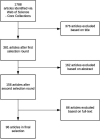Determinants of citation in the literature on diesel exhaust exposure and lung cancer: a citation analysis
- PMID: 33033008
- PMCID: PMC7542959
- DOI: 10.1136/bmjopen-2019-033967
Determinants of citation in the literature on diesel exhaust exposure and lung cancer: a citation analysis
Abstract
Objectives: Epidemiological research on the association between diesel exhaust exposure and lung cancer risk has some methodological challenges that give rise to different conclusions and intense debates. This raises the question about the role of selective citation and of citation bias in particular. Our aim was to investigate the occurrence and prevalence of selective citation in this field.
Design: Citation analysis.
Setting: Web of Science Core Collection.
Participants: We identified 96 publications in this network, with 4317 potential citations. For each publication, we extracted characteristics such as study conclusion and funding source. Some of these characteristics are related to the study content: study design, sample size, method of diesel exposure assessment, type of diesel technology under investigation, and whether smoking had been adjusted for.
Primary and secondary outcome measures: Whether a citation occurs or not, measured and analysed according to the preregistered protocol. Exploratively we analysed the association between funding source and study conclusion.
Results: Methodological content of a study was clearly related to citation, studies using more sophisticated methods were more likely to be cited. There was some evidence for citation bias: supportive publications had a higher chance of being cited than non-supportive ones, but after adjustment for study quality, this effect decreased substantially (adjusted OR 1.3, 95% CI 1.0 to 1.7). Explorative analyses indicated that three quarters of non-profit funded publications had a supportive study conclusion against only one quarter of the industry-funded publications.
Conclusions: There is evidence for selective citation within this field, but the evidence for citation bias was weak. It seems that factors related to the methodology had more impact on citation than the conclusion of a study. Interestingly, publications that were funded by industry were more skeptical about a causal relationship between diesel exhaust and lung cancer compared to non-profit-funded publications.
Keywords: citation bias; diesel exhaust; funding source; lung cancer; selective citation.
© Author(s) (or their employer(s)) 2020. Re-use permitted under CC BY-NC. No commercial re-use. See rights and permissions. Published by BMJ.
Conflict of interest statement
Competing interests: None declared.
Figures



Similar articles
-
The Diesel Exhaust in Miners study: a nested case-control study of lung cancer and diesel exhaust.J Natl Cancer Inst. 2012 Jun 6;104(11):855-68. doi: 10.1093/jnci/djs034. Epub 2012 Mar 5. J Natl Cancer Inst. 2012. PMID: 22393209 Free PMC article.
-
Lung cancer and diesel exhaust: an updated critical review of the occupational epidemiology literature.Crit Rev Toxicol. 2012 Aug;42(7):549-98. doi: 10.3109/10408444.2012.690725. Epub 2012 Jun 2. Crit Rev Toxicol. 2012. PMID: 22656672 Free PMC article. Review.
-
Selective citation in the literature on the hygiene hypothesis: a citation analysis on the association between infections and rhinitis.BMJ Open. 2019 Feb 19;9(2):e026518. doi: 10.1136/bmjopen-2018-026518. BMJ Open. 2019. PMID: 30782945 Free PMC article.
-
Exposure to diesel motor exhaust and lung cancer risk in a pooled analysis from case-control studies in Europe and Canada.Am J Respir Crit Care Med. 2011 Apr 1;183(7):941-8. doi: 10.1164/rccm.201006-0940OC. Epub 2010 Oct 29. Am J Respir Crit Care Med. 2011. PMID: 21037020 Free PMC article.
-
Diesel engine exhaust and lung cancer: an unproven association.Environ Health Perspect. 1995 Sep;103(9):812-8. doi: 10.1289/ehp.95103812. Environ Health Perspect. 1995. PMID: 7498093 Free PMC article. Review.
Cited by
-
The 'snowball effect': short and long-term consequences of early career alcohol industry research funding.Addict Res Theory. 2021 Jul 22;30(2):119-125. doi: 10.1080/16066359.2021.1952190. eCollection 2022. Addict Res Theory. 2021. PMID: 35299957 Free PMC article.
References
Publication types
MeSH terms
Substances
LinkOut - more resources
Full Text Sources
Medical
